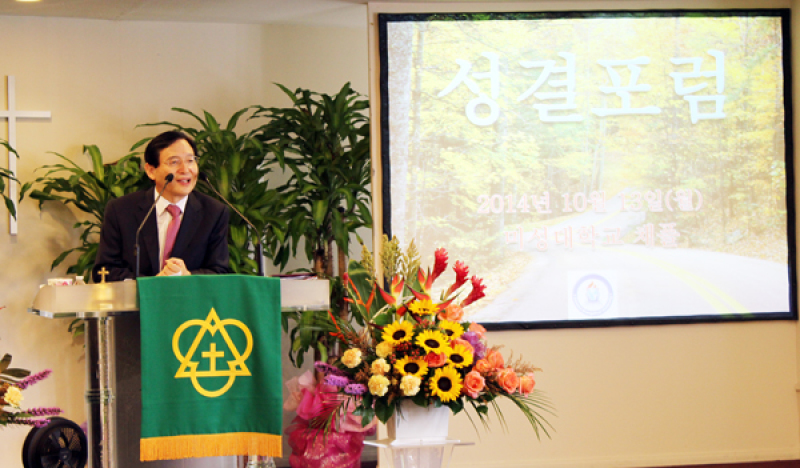

Suk-Sung Yoo spoke on how Dietrich Bonhoeffer's ideas can help to navigate the issue of pursuing peace in East Asia.
On October 13, Yoo spoke on "Bonhoeffer's Ideas on Peace and Peace in East Asia" at the Holiness Forum held at America Evangelical University. According to Yoo, Bonhoeffer is a pioneer of a Christian peace movement. He explained what a Christian idea of peace is according to Bonhoeffer. At the core of Bonhoeffer's ideas of peace are not taking revenge; non-violence; loving enemies; among others, and are founded on Jesus' teachings during his Sermon on the Mount. Bonhoeffer's ideas on peace are a little different from"”or rather, opposite from"”that of the world. The world's ideas of peace include political contracts, expansion of militaries and arms, among other tactics. Hence, their efforts are in order to avoid war or conflicts. But Bonhoeffer doesn't see this as true peace. This form of security is a way in which each party protects itself while stirring distrust for one another internally. However, peace is surrendering everything to God in faith and obedience, and thus peace tends to be the opposite concept of security.
Also according to Bonhoeffer, peace is a way in which truth and justice is actively carried out.
"Peace in the passive sense is a state in which there is a lack of war. But in an active sense, peace is the state in which justice is present," said Yoo. Bonhoeffer's ideas on peace was focused on an active pursuit of God's justice.
Bonhoeffer said that peace is God's command, and Jesus, as the Prince of Peace who came to this earth, is the actualization of peace, and that the cross is the foundation of peace on which the disciples are to build. And just as Christ came for others, the church also needs to be a church for others, Yoo said.
"In 1930, Bonhoeffer was teaching about his ideas on peace, and then he planned to assassinate Hitler in 1940. It was not that he gave up on maintaining peace; it was a way that he believed he was fulfilling God's command, by actively pursuing peace," Yoo explained. "Bonhoeffer believed that there needed to be a specific course of action, and thus in order to stop the bloodshed, he believed he had to eliminate Hitler."
How can these ideas on peace be applied to East Asia, which includes Korea, China, and Japan? Currently, the issues that threaten peace in East Asia include the nuclear weapons in North Korea; the conflict between Korea and Japan regarding Dokdo Island; Japan's distortion of history and imperialism; China's Northeast Project; and many others. Yoo said that there are five things that East Asia could learn to overcome these threats on East Asian peace.
First, he said that there must be an acknowledgement and repentance regarding the distortion of history. Just as Bonhoeffer emphasized the confession of sin, Yoo said that there must be a realization and repentance regarding past sins.
"Japan must repent for its past aggressive tactics and genocide," Yoo said. "Japan has only apologized in an official sense, but they still conceal, distort, and even glamorize their past faults."
Second, the three nations must oppose war, and pursue non-violent methods of peace.
"How would Bonhoeffer respond to the issue of the Korean and Japanese soldiers that were dispatched to the U.S.-Iraq war?" Yoo posed.
Third, just as Bonhoeffer saw that peace is an active pursuit of justice, East Asia must also put in efforts to pursue justice.
"The world today is confronted with issues such as terrorism and war, but these issues cannot be resolved without also resolving issues such as poverty and social justice," Yoo pointed out.
Fourth, there must be restoration in the church. Bonhoeffer emphasized the role of the church in the pursuit of peace. He said that the church, as the body of Christ, is the place in which Christ dwells. The three nations of East Asia must be aware of the church's role in the pursuit of peace.
Fifth, the already existent strategies of peace within Korea, Japan, and China, must be claimed. In Confucianism, Daoism, Mohism, Legalism, and the philosophies of the Korean Buddhist Wonhyo, there are already philosophies and schools of thought that pertain to maintaining peace. Yoo is suggesting that the three nations find these commonalities, and establish an order by which the three nations can peacefully coexist.
"The factors that threaten peace in East Asia include ethnocentrism and nationalism," said Yoo, and added that for Japan, the threat is its conservative nationalism; for China, its expansionism; and for North Korea, its nuclear weapons.
"We can learn a lot from Bonhoeffer who sought out peace," Yoo said in his concluding statements. "Bonhoeffer taught well the way that a Christian should live and Christ's church should be as His witnesses. And as the pioneer of community engagement, he also showed us how to pursue"”with love"”peace and justice."
The Holiness Forums were first started in 2003, and for the past 12 years, topics such as women in church leadership; conversations between Christians and those from other religions; the divisions and dilemmas of the immigrant church; mission work in North Korea; evangelism in the 2040 generation; evangelism in the workplace; evangelism in the military; and others were chosen in accordance with their relevance to the times, and were discussed in the forums.



















